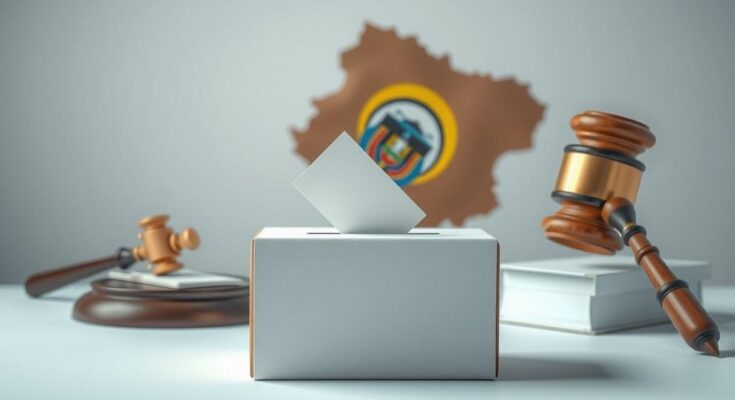Ecuador is set for a run-off in its presidential election, with Daniel Noboa leading at 44.4% and Luisa Gonzalez at 44.1%. The election reveals pressing issues of security and economic stability as both candidates vie for support in a country facing significant drug-related violence. Gonzalez’s unexpected surge in support reflects mounting public discontent with the current administration’s crime policies.
Ecuador is poised for a second-round run-off in its presidential election, as incumbent President Daniel Noboa and leftist challenger Luisa Gonzalez remain closely matched. With 80 percent of votes from the first round counted, Noboa leads with 44.4 percent, while Gonzalez closely trails with 44.1 percent. The run-off is anticipated to take place on April 13, should this trend continue, highlighting the rise in Gonzalez’s support amidst a struggling economy and escalating security concerns linked to drug-related violence.
Luisa Gonzalez, a political ally of former President Rafael Correa, expressed her satisfaction to jubilant supporters, emphasizing the surprising strength of her performance as a “statistical tie” with Noboa. Initial predictions had suggested that Noboa would secure a more commanding lead. His supporters celebrated his results, resonating hopes for continued economic change in the nation.
The election is regarded as a referendum on President Noboa’s stringent measures against increasing crime rates, which have spiraled due to drug cartel influences. Noboa’s administration has implemented aggressive tactics against violence, including a state of emergency and military presence in urban areas. However, these strategies have raised serious concerns regarding human rights violations amidst allegations of abuses by armed forces.
Complicating the current political landscape, President Noboa recently faced a ruling from the Constitutional Court that invalidated two decrees related to his campaign schedule. The ongoing tensions with his vice president are further straining Noboa’s ability to maneuver in the lead-up to the run-off, which is crucial for his political future.
The political environment in Ecuador has become increasingly tense amid a surge in violence linked primarily to drug cartels. The situation has forced the government to adopt strict policies aimed at combating crime, which have been met with resistance and criticism from human rights organizations. The incumbent President, who took office to complete his predecessor’s term, faces challenges not only from his political rivals but also from the pressing demands of an electorate concerned about safety and economic stability.
In summary, the Ecuadorian presidential election has revealed a critical division between incumbent Daniel Noboa and challenger Luisa Gonzalez, indicative of the electorate’s focus on security and economic recovery. Facing a run-off, both candidates must navigate complex political and social challenges, including public concerns regarding crime and governance. The outcome of this election will likely shape Ecuador’s future direction amidst ongoing security crises and economic instability.
Original Source: www.aljazeera.com




